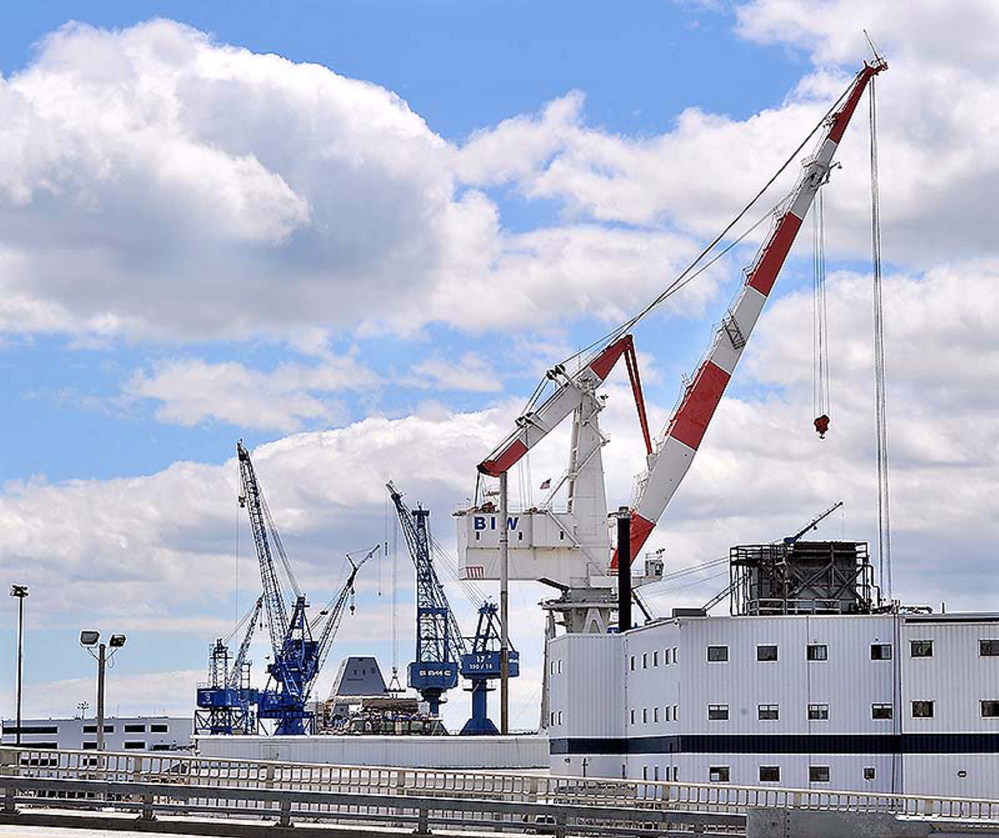An ongoing labor dispute at Bath Iron Works, one of Maine’s largest employers, spilled over into federal court Wednesday as the union that represents thousands of workers asked a judge to decide against having the dispute settled by arbitration.
The union, Local S6 chapter of the Industrial Union of Marine and Shipbuilding Workers of America, filed the lawsuit in U.S. District Court in Portland after it came to loggerheads with management at the General Dynamics-owned shipyard in Bath as it tries to reclassify workers’ jobs as defined by their contract.
The company is attempting to cut costs to improve its chance of landing a contract to build U.S. Coast Guard cutters, an initiative the company says relies on greater flexibility by management to assign workers.
The union’s president, Jay Wadleigh, said management is inappropriately trying to change the rules while there is an agreed-upon labor contract in place.
In January, the company said it wanted to reclassify workers, which the union has opposed. On April 2, Bath Iron Works informed the union that it planned to go ahead with its plan to reclassify workers over the union’s opposition and demanded arbitration, the lawsuit states. The suit filed Wednesday attempts to derail that arbitration.
“The company filed for an arbitration on this. They are trying to force our hand,” Wadleigh said. “You can’t just – in the middle of it – try to change the rules.”
The union asked the court to intervene, claiming Bath Iron Works’ plan for worker reclassifications is not covered under its current labor contract language, and that without a contractual mechanism, it can’t demand arbitration.
Wadleigh said the union agrees that the company needs to cut costs but believes it can do that with input from the union membership. He said that management forced a conflict by filing for arbitration outside usual contract talks.
An arbitration hearing has already been scheduled for May 29 to decide whether the company has standing to proceed. The federal lawsuit will go ahead at the same time as the arbitration process, Wadleigh said.
Bath Iron Works issued a one-page letter to its workforce later on Wednesday, saying that the company regrets that the lawsuit was filed and that arbitration is allowed under the terms of the contract.
“BIW believes that both parties must work together, either directly or with the assistance of an unbiased arbitrator, to resolve disputes in the most efficient and effective manner for the shipyard,” the letter states.
BIW spokesman Matt Wickenheiser released that letter in response to a request for comment about the lawsuit.
Management at the shipyard is preparing to eliminate as many as 1,200 jobs as it prepares for less Navy work in the years to come and sets its targets on smaller-scale Coast Guard work.
The yard has for decades built destroyers and other warships for the U.S. Navy, but that work is expected to dwindle as the Navy downsizes its fleet. BIW wants to bid on a contract potentially worth $10 billion next year to build 11 offshore patrol cutters for the Coast Guard.
“There is a lot at stake here – for BIW, our workers and the state of Maine. BIW employs more than 5,700 people from all of Maine’s 16 counties. Those employees represent an annual payroll in excess of $350 million and BIW spends $60 million per year with Maine-based suppliers, the vast majority of which are small businesses. To sustain that level of economic activity, BIW needs to win future work,” BIW said in its letter on Wednesday.
BIW will likely compete with two other shipyards for the Coast Guard contract and is furiously trying to lower its production costs to make itself more competitive in that bid process.
Starting in January, Bath Iron Works management proposed reassigning union workers of distinct classifications to do the “associate function” of a worker of another classification in order to make the whole workforce more efficient, according to the lawsuit.
The union leadership agreed that cost savings were necessary for the shipyard going forward but opposed the shipyard’s plan to outsource fabrication of some ship components – such as electrical panels, lockers and tables – that would save the company the amount of money it expected.
Scott Dolan can be reached at 791-6304 or at:
Twitter: @scottddolan
Send questions/comments to the editors.



Success. Please wait for the page to reload. If the page does not reload within 5 seconds, please refresh the page.
Enter your email and password to access comments.
Hi, to comment on stories you must . This profile is in addition to your subscription and website login.
Already have a commenting profile? .
Invalid username/password.
Please check your email to confirm and complete your registration.
Only subscribers are eligible to post comments. Please subscribe or login first for digital access. Here’s why.
Use the form below to reset your password. When you've submitted your account email, we will send an email with a reset code.